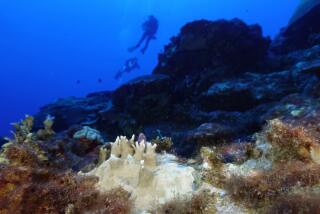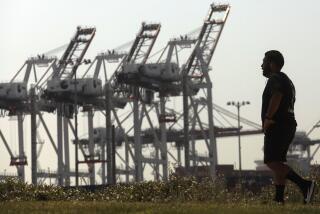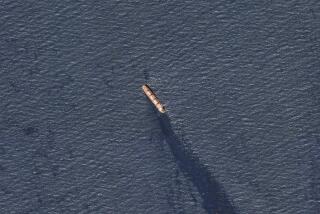Environment : Polluted Mediterranean Starting to Scrub Down : It’s too early for cheering. But the nations ringing Homer’s wine-dark sea are trying to stop dumping and start nurturing. And the sea, it seems, is forgiving.
- Share via
ATHENS — It is too early for cheers, but United Nations environmentalists report a heartening sea change: The polluted Mediterranean is making a comeback.
Cleanup programs by individual countries and joint cooperation by 17 nations that border the crossroads sea are paying off.
“The sea is forgiving. Ten years ago, conditions were deteriorating fast. We have reversed the trend and are moving in the right direction,” said Aldo Manos, coordinator of the U.N. Environmental Program’s Mediterranean Action Plan here.
In a series of protocols since 1978, Mediterranean neighbors, including good friends and bitter enemies, have agreed to stop dumping in Homer’s wine-dark sea and to police land-based sources of pollution.
Progress is uneven, but in addition to their own programs at home, Mediterranean countries with a population of 350 million--and 100 million annual tourists between them--now contribute to joint environmental monitoring and research. They also pledge cooperation in confronting emergencies such as oil spills.
Saving the sea is an issue of such bedrock self-interest that it encourages strange bedfellows. Signatories of regional anti-pollution agreements range from France, Spain and Italy, the Mediterranean’s worst polluter, to Yugoslavia, Malta and Monaco.
Libya, Syria, Lebanon and four other Arab states pledge common environmental cause with Israel. Around their same U.N. meeting table sit Greece and Turkey, and also Cyprus, the island they so bitterly dispute. Even self-isolated Communist maverick Albania attends meetings, as an observer.
The emerging regional community of interest is extending now to the protection of endangered Mediterranean species such as the monk seal and to the designation of protected historical areas and underwater parks, Manos said.
The regional search for a healthier Mediterranean is spurred by local and international alarm at pollution sapping the strength and beauty of the sea around which Western civilization grew up.
A decade ago, 85% of sewage from 120 coastal cities flowed into the “Med” without adequate treatment, according to U.N. figures. Factories and oil refineries pumped thousands of tons of heavy metals into the Mediterranean food chain. With them, one U.N. report says, 60,000 tons of detergents, 320,000 tons of phosphorous and 800,000 tons of nitrogen all went to sea.
Tankers, freighters, passenger liners and warships dumped thousands of tons of refuse and oil residue into the Mediterranean. By one estimate, as much as one-fourth of the world’s oil pollution wound up there, the United Nations notes.
Today, Manos says, about 20% of beaches in the 17 countries are still too polluted for safe swimming.
“That is a scandal, but 10 years ago, when things were at their worst, it was 25%.”
By now, seaborne pollution has been controlled, Manos says. That’s progress, but the way back is still a long one.
About 85% of what ails the Mediterranean now comes from its coastal strip in the form of industrial and agricultural waste and sewage, the United Nations says.
Big rivers assault the sea: the Rhone and the Ebro in the west, the Nile in the south. The Po spills poison by the ton, from Milan’s factories and the farms of Parma hog raisers, into a desperately ill Adriatic.
Last summer, Adriatic pollution spawned a noxious carpet of algae 100 miles long. At its peak, Venice alone harvested 500 tons of the bright green algae each day. Another crop is in prospect for this summer.
Italy, which is home to half of all Mediterranean cities, has earmarked $1 billion to fight Adriatic algae and another $3 billion to clean up the Po, Manos notes. It is also working on Adriatic rescue with neighboring Yugoslavia, where the United Nations and the World Bank are underwriting a pilot research program in the badly fouled bay at Split.
Mediterranean cities are major polluters. There are some municipal victories, but no shortage of unreconstructed polluters.
Demand for clean beaches has contributed to notable successes, though. Nice, France, and Genoa, Italy, have new treatment plants, and a $200-million sewage treatment system in Marseilles has led to a coveted blue flag from the European Community, denoting safe swimming.
With U.S. help, the Egyptian government is attacking the 100 most polluting industries along the Nile, and Turkey is spending $2 billion in an ambitious program to clean Istanbul’s historic Golden Horn. The Spanish government is reassessing coastal development after ecologically and aesthetically disastrous overbuilding along the Costa del Sol.
Some big cities are laggard in confronting the threat to their sea. Athens, a city of 4 million, pumps all its waste untreated into the Med. Every summer, Greek authorities tell would-be swimmers how far east or west of Athens they have to go to find safe beaches.
In Alexandria, Egypt, whose beaches attract as many as a million daily bathers from Cairo in summer, long pipes dumping sewage in shallow waters offshore need constant repair and ultimately will have to be replaced by treatment centers.
On balance, good news for the dirty Med is often belated and sometimes altogether lacking, but there at last seems to be enough of it to have turned the tide.
“Certainly, progress is not fast enough, but I am an optimist,” Manos said. “I think we can look forward to a better future.”
Ring Around the Med
THE PROBLEM:
Ten years ago, 85% of the sewage from 120 coastal cities in a variety of countries on the Mediterranean coast flowed into the sea without adequate treatment.
Ten years ago, factories and oil refineries pumped thousands of tons of heavy metals into the sea’s food chain. Tens of thousands of tons of detergents, phosphorous and nitrogen were also dumped into the Mediterranean.
Last summer, pollution in the Adriatic spawned a 100-mile-long carpet of algae. At its peak, Venice harvested 500 tons of algae each day. Another crop is expected this summer.
Athens, a city of 4 million, pumps all of its waste untreated into the Mediterranean.
Italy’s Po River spills poison by the ton, from Milan’s factories and farms, into the Adriatic.
The Rhone, Ebra and Nile rivers are also responsible for much of the Mediterranean’s pollution.
THE CLEAN-UP:
Since 1978, 17 Mediterranean nations have signed protocols agreeing to stop dumping in the sea and to police land-based sources of pollution.
The Egyptian government, with Washington’s help, is trying to clean up the 100 most polluting industries along the Nile.
Turkey is spending $2 billion to clean up Istanbul’s Golden Horn.
Spain is reassessing coastal development along the Costa del Sol.
Marseilles has safe swimming again after spending $200 million to build a sewage treatment system.
More to Read
Sign up for Essential California
The most important California stories and recommendations in your inbox every morning.
You may occasionally receive promotional content from the Los Angeles Times.













